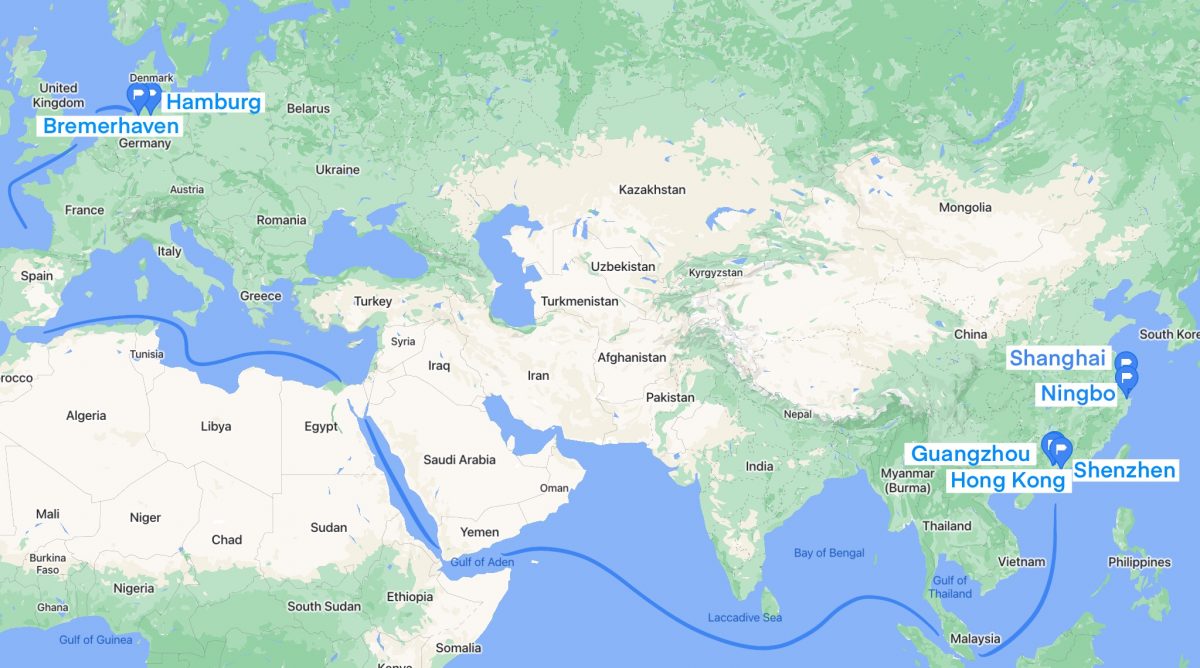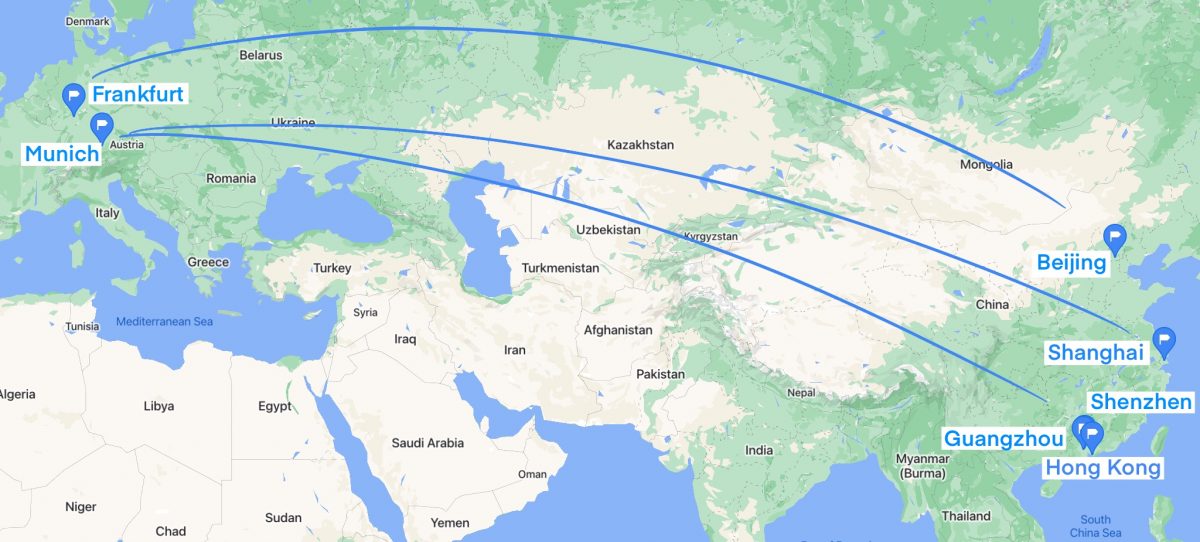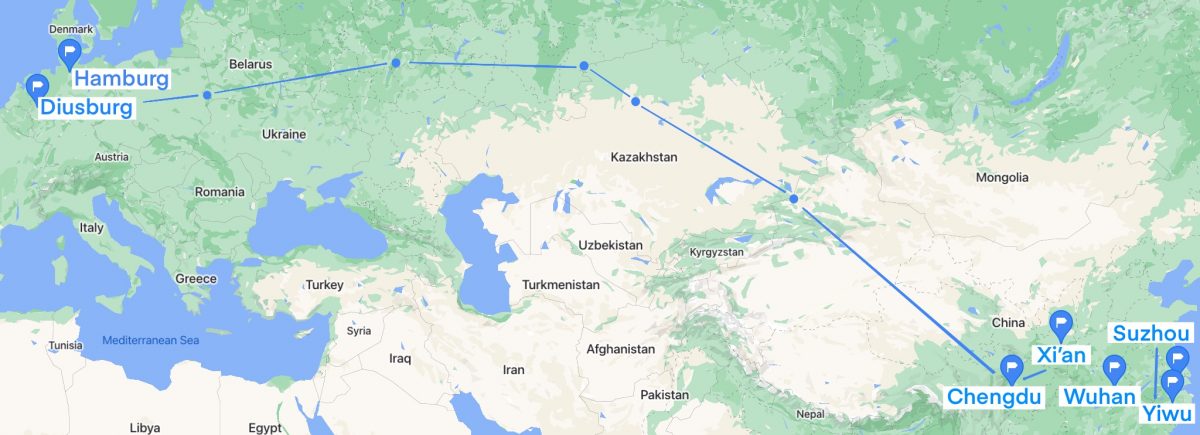Be your Logistics Department in China
Customized logistics solutions, your logistics expert in China
Customized logistics solutions, Shipping from China to the World
Tel:+8613424475220 Email:info@viputrans.com 
Germany is a country that is on the New Silk Road route. Cooperation between Germany and China is considered prosperous. Germany was the first European country to start the expansion of goods to China.
It bordering Denmark to the north, Poland and the Czech Republic to the east, Austria to the southeast, and Switzerland to the south-southwest, is the seventh-largest country in Europe.

Shipping from China to Germany involves several steps and considerations. Here's a general overview of the process:
Choose a shipping method: There are various shipping methods available, including air freight, sea freight, and courier services. The choice depends on factors such as the size, weight, urgency, and budget of your shipment.
Prepare the necessary documentation: Ensure you have the required documents, including commercial invoice, packing list, bill of lading or airway bill, and any specific documentation for customs clearance. Make sure all documents are accurately filled out and signed.
Packaging and labeling: Properly package your goods to ensure they are protected during transit. Label the packages with necessary information such as product descriptions, quantities, and shipping addresses.
Customs clearance: When shipping from China to Germany, your shipment will go through customs clearance. It is important to comply with all customs regulations and provide accurate and complete information. This may involve paying import duties, taxes, and fees.
Shipping insurance: Consider obtaining shipping insurance to protect your goods against loss or damage during transit. This is particularly important for valuable or fragile items.
Choose a freight forwarder or shipping agent: Working with a reliable freight forwarder or shipping agent can simplify the shipping process. They can handle logistics, documentation, customs clearance, and provide guidance on the best shipping options.
Transit time and tracking: Depending on the shipping method chosen, transit times can vary. Air freight is generally faster but more expensive, while sea freight takes longer but is more cost-effective. Ensure you have a tracking number to monitor the progress of your shipment.
Delivery and final steps: Once your shipment arrives in Germany, it will go through the customs clearance process. After customs clearance, the goods will be delivered to the designated address. You may need to coordinate with the shipping agent or carrier for the final delivery arrangements.
Germany was the most significant business partner of China in Europe, while for Germany, China is the third most important global partner and the first in Asia. Transport between these two countries is constantly evolving. Goods can now be delivered not only by sea but also by rail/air to terminals in Germany.
When shipping from China to Germany, there are several types of transportation options available. The choice of transportation method depends on factors such as the nature of the goods, budget, urgency, and volume of the shipment. Here are the main types of transportation for shipping between China and Germany:
Air Freight: Air freight is the fastest method of shipping and is suitable for time-sensitive or high-value goods. It offers quick transit times, usually ranging from a few days to a week. Air freight can be more expensive compared to other modes of transportation, but it provides efficient and reliable delivery.
Sea Freight:Sea freight is a cost-effective option for shipping large volumes of goods. It is suitable for less time-sensitive shipments as transit times can range from a few weeks to a couple of months, depending on the ports of departure and arrival. Sea freight is ideal for heavy or bulky items and offers a lower cost per unit.
a. Full Container Load (FCL): If you have enough goods to fill a container, you can opt for a full container load. This provides exclusive use of a container for your goods, offering more control over the shipping process.
b. Less than Container Load (LCL): If you don't have enough goods to fill a container, you can share container space with other shipments. LCL is a cost-effective option for smaller shipments, as you pay only for the space your goods occupy.
Rail Freight: Rail freight is a land-based transportation option that offers a balance between speed and cost. It provides a cost-effective alternative to air freight and faster transit times compared to sea freight. Rail freight is particularly suitable for shipping between China and Europe, with various routes available.
Courier Services: Courier services such as DHL, FedEx, UPS, and others offer door-to-door shipping solutions. They are convenient for smaller shipments or urgent deliveries. Courier services handle the entire shipping process, including customs clearance, and provide tracking services for real-time shipment updates.
Major ports in Germany
1. Hamburg
2. Bremerhaven

Major airports in Germany
1.Frankfurt airport (IATA CODE: FRA)
2. Munich airport (IATA CODE: MUC)
3.Dusseldorf (IATA CODE: DUS)
4. Hamburg (IATA CODE: HAM)

Major railway terminals in Germany
1. Duisburg
2. Hamburg

The duration of international shipping from China to Germany can vary depending on several factors, including the chosen shipping method, the distance between the ports of departure and arrival, customs clearance procedures, and any unforeseen circumstances. Here are some estimated transit times for different shipping methods:
Air Freight: Generally, air freight from China to Germany takes around 2 to 7 days. This is the fastest shipping method, ideal for time-sensitive or urgent shipments.
Sea Freight:Full Container Load (FCL): Transit times for FCL shipments by sea typically range from 25 to 40 days. This includes the time for loading, transit, and unloading at the respective ports.
Less than Container Load (LCL): LCL shipments by sea generally take longer than FCL due to the consolidation of multiple shipments. Transit times for LCL shipments can vary between 30 and 50 days.
It's important to note that sea freight transit times are estimates and can be influenced by factors such as the shipping route, weather conditions, and port congestion.
Rail Freight: Rail freight from China to Germany offers a faster alternative to sea freight and a more cost-effective option compared to air freight. Transit times for rail freight can range from 18 to 24 days, depending on the specific route and any potential delays.
Courier Services: Courier services such as DHL, FedEx, and UPS typically provide expedited shipping options. The transit time for courier services from China to Germany is generally around 3 to 7 days, offering a quick delivery option for smaller shipments.
Each transportation method has its advantages and considerations. It's important to assess your specific requirements and choose the option that best suits your needs in terms of budget, timeline, and the nature of your goods.
Shawn.Liao (Mr.);E-MAIL:sales04@viputrans.com ; Phone/Wechat:+8618926970495 ; Whatsapp/Skype: +8613431563558 .
Copyright © 2003-2025 VIPU Supply Chain Logistics Co., Ltd. | All Rights Reserved
LOGISTICS | E-COMMERCIAL FULFILLMENT | ABOUT US | CASE | NEWS | VIDEO | CONTACT US
We will find the fastest or the cheapest way for your shipment. Please specify: where from, where to, what to ship.